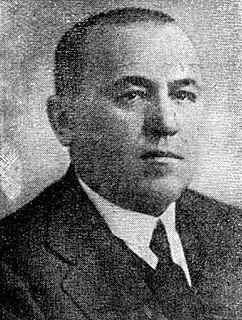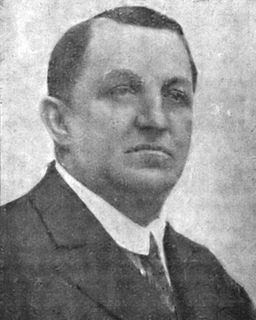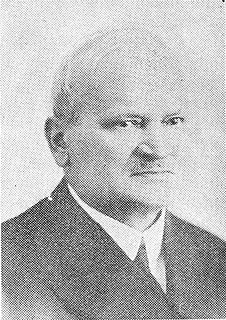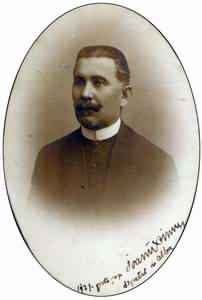 W
WNicolae Bălan was an Austro-Hungarian-born Romanian cleric, a metropolitan bishop of the Romanian Orthodox Church. The son of a priest, he graduated from Czernowitz University and taught theology at Sibiu from 1905 to 1920. That year, he became Metropolitan of Transylvania, an office he would hold for the rest of his life. In the 1930s, he was an open supporter of the Iron Guard. In 1942, during the Holocaust, he intervened in Bucharest against the planned deportation of Romanian Jews from the Regat, Southern Transylvania and the Banat to the Nazi extermination camps. In 1948, after a communist regime was established, he publicly assisted the new authorities in their effort to disband the Romanian Greek-Catholic Church.
 W
WAlexandru Borza was a Romanian botanist, Greek-Catholic priest and honorary archpriest of Cluj.
 W
WRoman Ciorogariu was an Imperial Austrian-born Romanian bishop within the Romanian Orthodox Church, as well as a journalist and educator.
 W
WAurel Cosma was a Romanian lawyer and politician. A leader of the National Party in Timișoara before World War I, Cosma was a representative of the Banat in the Alba Iulia National Assembly that voted for the Union of Transylvania with Romania on 1 December 1918.
 W
WMiron Cristea was an Austro-Hungarian-born Romanian cleric and politician.
 W
WIoan Flueraș was a Romanian social democratic politician and a victim of the communist regime.
 W
WBlessed Valeriu Traian Frențiu was the Bishop of the Eparchy of Oradea Mare of the Romanian Greek Catholic Church from 1922 to 1952. His beatification occurred on 2 June 2019.
 W
WPetru Groza was an Austro-Hungarian-born Romanian politician, best known as the first Prime Minister of the Communist Party-dominated government under Soviet occupation during the early stages of the Communist regime in Romania, and later as the President of the Presidium of the Great National Assembly from 1952 until his death in 1958.
 W
WEmil Hațieganu was a Romanian politician and jurist, a prominent member of the Romanian National Party (PNR) and of its successor, the National Peasants' Party (PNȚ); he was physician Iuliu Hațieganu's brother. Before his arrest, he was an honorary member of the Romanian Academy.
 W
WFrancisc Hossu-Longin was an Imperial Austrian-born Romanian lawyer and memoirist.
 W
WIuliu Hossu was a Romanian Greek-Catholic prelate who served as the Bishop of Cluj-Gherla. Pope Paul VI elevated Hossu to the rank of cardinal in pectore, that is, secretly, in 1969 but did not publish his appointment until after Hossu's death. The Communist authorities arrested Bishop Hossu on 28 October 1948. From 1950 to 1955 he was detained as political prisoner at the Sighet Prison. He spent the rest of his life under house arrest and died in 1970.
 W
WAvram Imbroane was an Austro-Hungarian-born Romanian politician, businessman, and Orthodox priest. Born in the western half of Banat, he was active in nationalist agitation among that region's Romanian community, and later also in Transylvania. By the time of World War I, he supported secession and the unconditional union of Transylvania and the Banat with the Kingdom of Romania. He fled Austria-Hungary and engaged in propaganda work—first in Romania, then among the Transylvanian prisoners-of-war in the Russian Republic. In late 1918, he returned to the Banat and became an active participant in the unionist struggle, participating in the assemblies of the Great Union.
Emil Isac was an Austro-Hungarian-born Romanian poet, dramatist, short story writer and critic. Noted as one of the pioneers of Symbolism and modernist literature in his native region of Transylvania, he was in tandem one of the leading young voices of the Symbolist movement in the neighboring Kingdom of Romania. Moving from prose poems with cosmopolitan traits, fusing Neo-romantic subjects with modernist free verse, he later created a lyrical discourse in the line of Social Realism. Isac was likewise known for criticizing traditionalist and nationalist trends in local literature, but, by the end of World War I, opened his own poetry to various traditionalist influences.
 W
WIosif Jumanca was an Austro-Hungarian-born Romanian politician.
 W
WIon Lapedatu was finance minister of Romania (1926-1927), Governor of the National Bank of Romania (1944-1945), and honorary member of the Romanian Academy.
 W
WIlie Lazăr was a Romanian jurist and politician, a leading member of the National Peasants' Party in the interwar period and the right-hand man of Iuliu Maniu.
 W
WIoan Lupaş was a Romanian historian, academic, politician, Orthodox theologian and priest. He was a member of the Romanian Academy.
 W
WIuliu Maniu was an Austro-Hungarian-born lawyer and Romanian politician. He was a leader of the National Party of Transylvania and Banat before and after World War I, playing an important role in the Union of Transylvania with Romania.
 W
WSabin Manuilă was an Austro-Hungarian-born Romanian statistician, demographer and physician. A nationalist activist during World War I, he became noted for his pioneering research into the biostatistics of Transylvania and Banat regions, as well as a promoter of eugenics and social interventionism. As a bio- and geopolitician, Manuilă advocated the consolidation of Greater Romania through population exchanges, colonization, state-sponsored assimilation, or discriminatory policies.
 W
WAlexandru Nicolescu was a Romanian bishop of the Greek-Catholic Church. Born in Tulgheș, Harghita County, Transylvania, he studied at the Congregation for the Evangelization of Peoples in Rome from 1898 to 1904, earning a doctorate in Philosophy and Theology. Returning to Blaj, he was sent as a missionary priest to North America. Once back in Transylvania, he taught of moral theology at the Blaj Theological Seminary.
 W
WGheorghe Pop de Băsești or George Pop de Băsești, also known under the nickname Badea Gheorghe or Badea George was an Imperial Austrian-born Romanian politician, who served as vice president (1881–1902) and president (1902–1919) of the Romanian National Party at a time when Transylvania was part of the Kingdom of Hungary within Austria-Hungary, and eventually as the president of the Alba Iulia National Assembly that declared the Union of Transylvania with Romania on 1 December 1918.
 W
WȘtefan Cicio Pop was a Romanian politician.
 W
WDemetriu Radu was between 1897 and 1903 the Greek Catholic Bishop of Lugoj, and from 1903 to 1920 the Greek Catholic Bishop of Oradea Mare.
 W
WIoan Simu was an Austro-Hungarian-born Romanian Greek-Catholic priest and politician.
 W
WVasile Suciu was a Romanian Greek-Catholic Metropolitan bishop of the Archdiocese of Făgăraș and Alba Iulia, considered to be the most important theologian of the Greek-Catholic Church in Transylvania.
 W
WAlexandru Vaida-Voevod or Vaida-Voievod was an Austro-Hungarian-born Romanian politician who was a supporter and promoter of the union of Transylvania with the Romanian Old Kingdom. He later served as 28th Prime Minister of Romania.